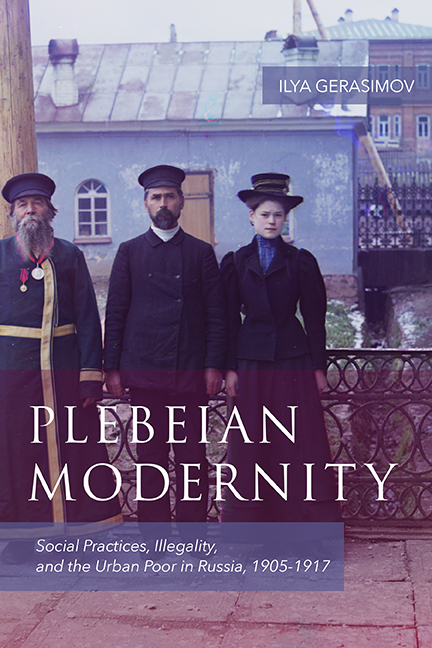Book contents
- Frontmatter
- Contents
- Acknowledgments
- Note on Editorial Conventions
- Introduction: The Subalterns Speak Out: Gerasim and the Infamous
- 1 Writing Degree Zero, and Beyond: Reading Social Practices between the Lines
- 2 The Middle Volga City as the Middle Ground: Urban Plebeian Society
- 3 The Patriarchal Metropolis: Trespassing Social Barriers in Late Imperial Vilna
- 4 “We Only Kill Each Other”: The Anthropology of Deadly Violence and Contested Intergroup Boundaries
- 5 The Transformative Social Experience of Illegality
- Epilogue: Gerasim in Power: A Plebeian Modernity
- Notes
- Selected Bibliography
- Index
5 - The Transformative Social Experience of Illegality
Published online by Cambridge University Press: 09 June 2021
- Frontmatter
- Contents
- Acknowledgments
- Note on Editorial Conventions
- Introduction: The Subalterns Speak Out: Gerasim and the Infamous
- 1 Writing Degree Zero, and Beyond: Reading Social Practices between the Lines
- 2 The Middle Volga City as the Middle Ground: Urban Plebeian Society
- 3 The Patriarchal Metropolis: Trespassing Social Barriers in Late Imperial Vilna
- 4 “We Only Kill Each Other”: The Anthropology of Deadly Violence and Contested Intergroup Boundaries
- 5 The Transformative Social Experience of Illegality
- Epilogue: Gerasim in Power: A Plebeian Modernity
- Notes
- Selected Bibliography
- Index
Summary
A focus on social practices helps to make sense out of the seemingly chaotic social interactions of low-class urbanites, so it seems logical to inquire whether those practices formed a social space (if not a social order) of their own. In our attempt to understand the motivation and rationality of people who left a trace in written records mainly by their seemingly unjustified outbursts of rage, petty theft, or ethnic slurs, we have looked into social practices as a factor that structured plebeian society and mediated the communication of meanings within it. Judging “every man according to his works,” we have thus far skipped the elusive problem of human nature: how certain values and world views affected the formation of social practices of the middle ground, patriarchality, and violence, and how the integrating potential of these practices, in turn, resulted in the change in basic social attitudes. In essence, this is a question of the relationship between social dynamics and structures, and how rapid social transformation creates a social space in its own right—something that the usual transitological approach treats as a marginal phenomenon between the real states of the old regime and the normative future endpoint of transition. The old regime of the Russian Empire was well attuned to handle the challenges of modernity and human diversity, but only before the advance of mass society. “The imperial rights regime” granted a certain degree of legal recognition to self-evident “natural” social collectivities, but there was nothing self-evident about the emerging plebeian mass society, with external and internal boundaries unstable and negotiated through self-organization. In many ways, this new social milieu reproduced the logic of the imperial situation and was a product of it, but its formal institutionalization would have required very different political and legal arrangements. The imperial rights regime made the emergence of Russian mass society possible, but it could not legalize it formally.
To people living in a society in flux, this was the only and ultimate reality, much more significant than anything they had left in the past or could anticipate in the future.
- Type
- Chapter
- Information
- Plebeian ModernitySocial Practices, Illegality, and the Urban Poor in Russia, 1906–1916, pp. 133 - 170Publisher: Boydell & BrewerPrint publication year: 2018

